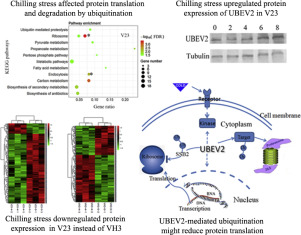Journal of Proteomics ( IF 2.8 ) Pub Date : 2020-01-23 , DOI: 10.1016/j.jprot.2020.103668 Ming Gong 1 , Zhengpeng Li 2 , Jianing Wan 2 , Mingjie Chen 2 , Hong Wang 2 , Junjun Shang 2 , Sichi Zhou 2 , Qi Tan 2 , Ying Wang 2 , Dapeng Bao 2

|
In Volvariella volvacea, an important edible mushroom species, cryogenic autolysis is a typical part of abnormal metabolism; however, the underlying mechanisms remain unclear. Ubiquitylome analysis revealed that chilling stress (CS) affected protein translation and degradation by ubiquitination. Comparative proteomics analysis showed that CS downregulated protein expression in V. volvacea V23 instead of VH3 (improved chilling stress resistance strain). The integrative ubiquitylome, proteomics, and transcriptome analyses indicated that CS reduced protein translation by the ubiquitination of ribosomal proteins. An activity assay of the 20S proteasome showed that CS decreased the degradation efficiency of the ubiquitin-proteasome system. UBEV2, one type of ubiquitin-conjugating enzyme E2 (UBE2) in V. volvacea, was upregulated after cold stress treatment using western blot analysis. GST pull-down experiments of UBEV2 provided evidence that CS affected protein translation by the ubiquitination of ribosomal proteins. Co-IP experiments confirmed that UBEV2 bound to the ubiquitinated SSB2, a ribosome-associated molecular chaperone. An anti-freezing experiment demonstrated that the UBE2 inhibitor could improve the cold stress resistance of V. volvacea. Our observations revealed that CS triggered ubiquitination-mediated autolysis associated with a decrease in protein translation and highlighted the mechanistic role of UBEV2 in facilitating cryogenic autolysis in V. volvacea.
Significance
Volvariella volvacea, the edible straw mushroom, is a highly nutritious food source widely cultivated on a commercial scale in tropical and subtropical regions. The challenges associated with the cryogenic autolysis preservation of V. volvacea have limited its marketability. This issue of cryogenic autolysis is both an interesting scientific problem to solve and a practical economic matter. Integrative ubiquitylome, proteomics, and transcriptome analyses, together with GST pulldown and Co-IP experiments, indicated that chilling stress reduced protein translation by the ubiquitination of ribosomal proteins in V. volvacea. This study significantly contributes to our understanding of ubiquitination-mediated autolysis associated with a decrease in protein translation in V. volvacea. Our data highlight the mechanistic role of UBEV2 in facilitating the cryogenic autolysis of V. volvacea. We provided a new idea for the preservation of V. volvacea by inhibiting UBEV2 to increase its marketability.
中文翻译:

低温胁迫通过沃尔沃氏菌中核糖体蛋白的泛素化作用减少了蛋白翻译。
在重要的可食用蘑菇物种中的草食单胞菌中,低温自溶是异常代谢的典型部分。但是,其潜在机制仍不清楚。泛素体组分析显示,冷应激(CS)通过泛素化影响蛋白质的翻译和降解。比较蛋白质组学分析表明CS降低了菌丝菌中的蛋白表达用V23代替VH3(改善的抗冷应力应变)。综合泛素化组,蛋白质组学和转录组分析表明,CS通过核糖体蛋白的泛素化减少了蛋白质翻译。20S蛋白酶体的活性分析表明,CS降低了泛素-蛋白酶体系统的降解效率。UBEV2,一种类型的泛素缀在酶E2(UBE2)草菇使用蛋白质印迹分析,在冷应激处理后,其上调。UBEV2的GST下拉实验提供了CS通过核糖体蛋白的泛素化影响蛋白翻译的证据。Co-IP实验证实UBEV2与泛素化SSB2(核糖体相关的分子伴侣)结合。防冻剂实验证明,UBE2抑制剂可以改善的冷胁迫抗性草菇。我们的观察结果表明,CS触发了泛素介导的自溶,与蛋白质翻译的减少有关,并突出了UBEV2在促进弧菌中低温自溶中的作用。
意义
食草草菇(Volvariella volvacea)是一种可食用的草菇,是一种营养丰富的食物来源,在热带和亚热带地区以商业规模广泛种植。灭弧菌的低温自溶保存相关的挑战限制了它的可销售性。低温自溶问题既是要解决的有趣的科学问题,也是实际的经济问题。综合的泛素化组,蛋白质组学和转录组分析,以及GST下拉和Co-IP实验,表明低温胁迫通过核糖体蛋白在菌丝菌中的泛素化减少了蛋白质翻译。这项研究大大有助于我们对泛素介导的自溶与蛋白质翻译减少相关的理解。V. volvacea。我们的数据突出了促进低温自溶UBEV2的机械作用,草菇。我们提供了新的思路以保存草菇通过抑制UBEV2,以增加其市场竞争力。










































 京公网安备 11010802027423号
京公网安备 11010802027423号